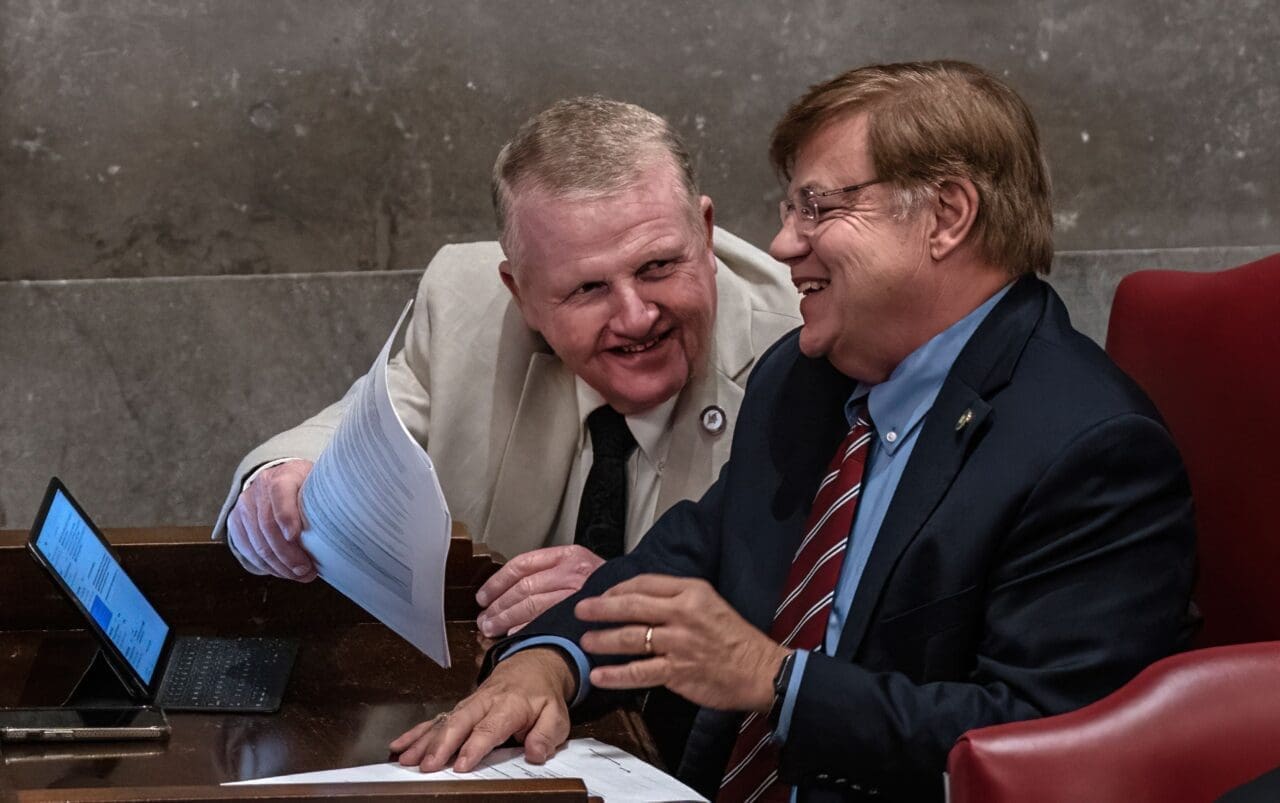Ah yes, nothing like opening the new year with reports of an alleged sexual harassment complaint, followed by denials, of course. It’s deja vu all over again.
Forget private school vouchers, abortion regulations and transgender restrictions. It’s all about sex, at least until they start beating each other over the head in the House chamber, where love is not in the air.
The latest hoopla stems from what else? Efforts to cover up wrongdoing, all disguised as attempts to protect victims.
When the House passed rules designed to keep the identities of sexual harassment victims secret after the Jeremy Durham debacle of 2016, it simply set up a method for all details to be hush-hush, including the expense of money to relocate young interns from one apartment to another, making sexual harassment complaints an exception to the state’s Public Records Act.
Thus, when Rep. Scotty Campbell of East Tennessee was found to have harassed an intern last spring, the House hid behind its rules. Only some solid reporting from NewsChannel5 outed the culprits, who spent a decent amount of cash to pay off the young woman and keep her quiet.
Here we are nine months later regurgitating the case because Nashville attorney Brian Manookian had the wherewithal to file a public records lawsuit challenging the state’s refusal to divulge its expenses.
In his initial filing, Manookian sought mainly to find out how much the state spent on the Campbell case. He also asked whether any complaints had been filed against House Republican Caucus Chairman Jeremy Faison by a certain woman.
House Speaker Cameron Sexton took to X to say “Contrary to the serious inference included in the order, no complaint has been filed against Chairman (Jeremy) Faison,” but perhaps he should have checked with lawyers for the legislature before implying Judge Russell Perkins was lying.
Manookian later narrowed the scope of his public records questions at the state’s request and didn’t mention Faison the second time around.
In this ruling this week, though, Chancellor Russell Perkins listed the records submitted by the state’s attorneys for an in camera inspection, including: a four-page cover letter marked “HIGHLY CONFIDENTIAL” from the state’s attorneys detailing the envelope’s contents; a blue letter-size folder from Legislative Administration Director Connie Ridley labeled “COMPLAINT 3/17/23” with materials dealing with the Campbell investigation; documents about media inquiries and Ridley’s further engagement with an alleged victim; and a second blue letter-size folder dated April 5, 2023 with “an alleged victim’s first name containing two pages of notes pertaining to a complaint” against Faison; and redacted and non-redacted personnel files of Faison.
Incidentally, Perkins ruled against Manookian’s request to release the financial information, a decision that could be appealed so we could be discussing this thing a year from now. It’s further proof the state’s Public Records Act is fallible.
But back on the judge’s ruling.
House Speaker Cameron Sexton, who just hired a new spokesman this week, issued an X statement Wednesday afternoon, once the news broke, saying, “Contrary to the serious inference included in the order, no complaint has been filed against Chairman Faison.”

Maybe he should have consulted first with Ridley and the state’s outside attorneys with Sherrard Roe Voigt Harbison, who were authorized by Gov. Bill Lee at $375 per hour, before accusing Perkins of lying.
It would be one thing if the House Democratic Caucus had turned over the documents to the court. But in this case, Perkins’ ruling says the state’s attorneys gave that information to the court. All the chancellor did was make note of it – unless he was trying to throw a dog a bone.
And while we’re talking about inferences, the inclusion of two pages of notes pertaining to a complaint about Faison could have come about because Ridley and the attorneys were responding to Manookian’s request for records relating to moving expenses for a legislative intern in 2021, 2022 or 2023 and the judge just included the Faison matter in the ruling because it was part of the package. It could mean the state paid thousands of dollars to move yet another intern.
Perkins was butting up against a deadline to rule or face sanctions amid complaints he was too slow in handling cases. Was this a semi-rush job or did he want to make Faison look bad?
We’ll likely never know because judges aren’t in the habit of explaining their decisions. And at this point we can’t determine whether the Office of Legislative Administration or a House ethics committee looked into the matter because Ridley doesn’t have to give up the information.
It might not be a big deal if Faison hadn’t played a role in Campbell’s banishment. Just two hours after saying he was going to stay in the Legislature in spite of TV reports about the sexual harassment case, Campbell vanished after someone in House leadership told him to go. Sexton and House Majority Leader William Lamberth denied telling him to leave in a post-session press conference that night, but Faison stayed quiet.
Of course, the expense of state money to hide shenanigans is always problematic.
As with most cover-ups, things get worse with time. So we start the 2024 legislative session thinking about more than bills and bull. We have to wonder how far leadership will go to protect one of their own.
It’s that time of the year
Lawmakers aren’t allowed to raise money during a legislative session. They’re always in a hurry to get out these days so they can go home and extort constituents.
But some groups are willing to help them fill their coffers. Take, for instance, the Tennessee Chamber of Commerce’s work on behalf of House members such as Banking and Consumer Affairs Subcommittee Chairman Dennis Powers, R-Jacksboro, Consumer Committee Chairman Kevin Vaughan, R-Collierville, and Business and Utilities Subcommittee Chairman Clark Boyd, R-Lebanon.
The Chamber is holding consecutive fundraisers Jan. 8, the day before the session starts, for those three lawmakers and letting donors know how to give to their campaigns or their political action committees.

The lawmakers will be responsible for reporting any contributions, but the Chamber is required to report any in-kind contributions such as payment for food and drink, and those likely would have to be split on candidate and PAC reports as well, according to the Registry of Election Finance.
Tennessee Chamber Executive Director Bradley Jackson calls Tennessee a “dual filing state” and says the Chamber will report its expenses. The Chamber’s PAC, however, reported no in-kind contributions in 2022.
Considering the events are scheduled around lunchtime, food is likely to be served, and as they say, it’s always 5 o’clock somewhere.
This is not a poke at the Chamber. But a little imbibing could make folks forgetful, and some are wondering if law firms and other benefactors are turning in their numbers.
Missing direction
Fresh off a second ankle surgery, Lt. Gov. Randy McNally will be absent the first few weeks of the session. Under doctor’s orders, he’ll be healing and undergoing physical therapy at home in Oak Ridge.
“While I will not be physically present, I will be monitoring proceedings remotely and will be in daily, if not hourly, contact with Senate leadership and staff. I look forward to returning to work in person as soon as I am able,” McNally said in a statement this week.

In his absence, Speaker Pro Tempore Ferrell Haile of Gallatin and Deputy Speakers Dawn White, Shane Reeves and John Stevens will handle the gavel in Senate floor sessions.
McNally had a rocky start to the 2023 session thanks to revelations he was sending out fire emojis to a young gay man. And at a November Senate Republican Caucus event he was wearing hospital scrubs and using a wheelchair after being in a walking boot much of the year.
Yet at a groundbreaking event for a law enforcement training facility in late summer he told the Lookout he plans to seek re-election to the speaker’s post in 2024, guaranteeing he wants to finish this four-year term in office. He wouldn’t promise to seek another term in 2026, though.
One wonders if this ankle upheaval will change his mind and expedite a battle for the Senate’s top job. We can hardly wait.
We don’t need no stinkin’ rules
Setting guidelines for House debate is expected to be the biggest early point of contention in the Legislature, and Republicans might not be budging from strict guidelines they adopted for an August special session. The House Rules Committee is set to meet Monday at 11 a.m., and members who want to propose changes are to turn them in to House Leader Lamberth by this Friday at 4:30.
Democrats figure they’ll get one minute to peruse the proposed rules before an up-or-down vote.

Those August rules, which also prohibited signs before a court said they should be allowed, restricted lawmakers for disrupting proceedings, going off-topic and impugning other members, enabling Speaker Sexton to stop so-called violators from speaking for days and then banning them for the rest of the special session.
Such rules were designed to keep Reps. Justin Jones and Justin J. Pearson from leading another rally on the House floor, which led to their expulsion and eventual reappointments and re-elections in early 2023 – and quite a bit of coverage which enabled them to raise a boatload of money. (It remains to be seen whether they’ll use that money to try to defeat sitting Democrats who disagree with their tactics. One also wonders whether veteran Democrats will try to keep them under wraps this session.)
Regardless, the special session House rules wound up backfiring – most of Sexton’s strategies do – as Democrats protested with a walkout after Jones was silenced. Then a scrum broke out in the session’s final moments as Pearson and Sexton bumped and Pearson then went toe-to-toe with Lamberth. It made for great video.
Ah, those halcyon days.
“The first kick I took was when I hit the ground.” *
(* “Born in the USA,” The Boss. Bruce Springsteen.)
The article in this post was originally published on Tennessee Lookout and parts of it are included here under a Creative Commons license CC BY-ND 4.0








